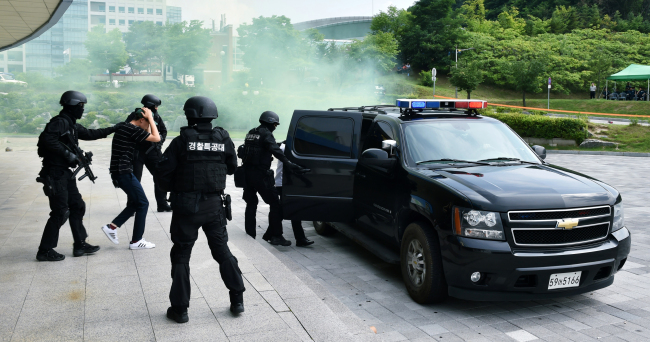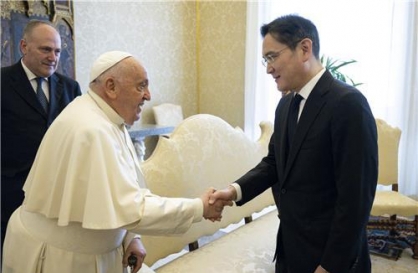Amid rising terror threats, Korea remains vulnerable
By Shin Hyon-heePublished : June 26, 2016 - 17:36
In January 2015, an 18-year-old who went missing in Turkey shook South Korean society after being found to have illegally crossed the border to Syria to join the Islamic State extremist group.
The boy, identified by his surname Kim, had deliberately planned his trip and vanished with the help of a Turkish man he met online, Seoul authorities said. The police retrieved more than 50 images from his computer of IS jihadists, IS flags and Muslim women, on top of a flurry of related Web search evidence and bookmarks.
He effectively became the first confirmed Korean IS fighter, receiving training in an unidentified location, according to the National Intelligence Service.
The boy, identified by his surname Kim, had deliberately planned his trip and vanished with the help of a Turkish man he met online, Seoul authorities said. The police retrieved more than 50 images from his computer of IS jihadists, IS flags and Muslim women, on top of a flurry of related Web search evidence and bookmarks.
He effectively became the first confirmed Korean IS fighter, receiving training in an unidentified location, according to the National Intelligence Service.

A year and a half later, the threats of the militant group and a terror attack at home have only continued to escalate and grow substantive, spawning concerns about the country’s readiness.
Last September, the IS named South Korea a member of the U.S.-led “crusader coalition,” alongside Japan, Taiwan and many other nations.
Seoul relocated its Libya embassy to Tunisia in April 2015 after a group of armed gunmen attacked, it killing two local guards and wounding another. The Tripoli chapter of the Islamic State militant group claimed responsibility via Twitter, lauding the “removal” of the watchmen.
Last week, the spy agency distributed a rare press release saying the IS designated a South Korean citizen and U.S. Air Force installations in Osan and Gunsan as subjects for terror acts.
They were part of the organization’s blacklist of 77 U.S. and NATO air bases around the world and civilians from 21 countries, which included their addresses and personal information as obtained by the hacker group United Cyber Caliphate. The IS also spread the message via messaging app Telegram to “Kill them strongly to take revenge for Muslims.”
“This confirmed yet again that the ISIL (Islamic State of Iraq and Levant) has included South Korea among its terror targets,” the NIS said in a statement.
“Starting with the Paris terror in November, ISIL has been expanding its reach not only within Europe and the Americas, but also into Asia, while maximizing threats by inciting disguised refugees and homegrown sympathetic forces.”
Over the last five years, 50 foreign nationals found to be members of terrorist organizations have been deported, the NIS noted. Among them was an Indonesian who joined the IS group after spending years at a factory complex in Daegu, though he later died in an operation.
The agency has also pointed to botched attempts by two Korean citizens to become IS fighters.
“Terror threats by Korean and foreign nationals are gradually turning into reality.”
In the aftermath of the Paris attack, Seoul notched up its four-tier alert level from “concern” to the second-highest of “caution,” and tightened security at major facilities.
NIS director Lee Byung-ho has called for “full readiness for the possibilities for an establishment of terrorism infrastructure in the form of a ‘lone wolf.’”
Powered by the recent enactment of antiterrorism legislation, the government has installed an intra-agency antiterrorism center under the Prime Minister’s Office to monitor any physical and cyberterrorist movements and trail the suspected perpetrators’ money and network.
Yet the country needs a more systematic prevention and response mechanism on its own and in cooperation with the U.S. and other partners rather than simply a pangovernmental consultative body, critics say.
Some experts raised the possibility that North Korea may join forces with international terrorist organizations to engage in a complex form of terrorism consisting of simultaneous physical and cyberattacks.
“The government should scale up its antiterror budget and workforce, benchmarking the steps taken such as by the U.S. following the 9/11 attack and France after the Paris tragedy,” said Yoo Dong-ryul, president of the Korean Institute of Liberal Democracy, during a forum last Thursday in Seoul on terror threats and national security.
“There also needs to be a checklist, alert system and manuals with which the officials can better monitor, prevent and respond to North Korea or other groups’ terror activities, while regular antiterror drills should be held with specialized staff to improve the existing measures and intra-agency teamwork in a contingency.”
Others raised the need for a more comprehensive approach to the IS issues, taking into account possible shifts in Washington’s Syria policy after the presidential election later this year.
Presumptive Democratic presidential nominee and former U.S. Secretary of State Hillary Clinton has called for the international coalition to beef up air strikes and ground forces to combat the IS in Syria and Iraq.
During a speech following the Paris attack in New York, she said the allied air strikes “will have to be combined with ground forces actually taking back more territory from (IS),” adding that “every society faces a choice between fear and resolve.”
Given persistent criticism on incumbent U.S. President Barack Obama’s policy, she may seek greater personnel and equipment contribution from allies to the operation if elected, which would pose a thorny choice to Seoul as a top U.S. partner in the region.
But a senior Seoul official downplayed the possibility for South Korea’s dispatch of ground troops, citing the political sensitivity and society’s trauma stemming from the hostage crises in Iraq in 2004 and Afghanistan in 2007.
“Unless a major attack occurs here entailing high casualties, or even if it does so, it would be extremely difficult for our administration to decide to send combat soldiers, and the U.S. understands this very well from past lessons,” the official said.
Another top ministry official said: “When it comes to IS and terror issues, it’s hard to predict when, where and how an attack would come for any country. Taking precautionary safeguards internally are a must, but thorough international cooperation is indispensable to thwarting another terror act.”
By Shin Hyon-hee (heeshin@heraldcorp.com)
Last September, the IS named South Korea a member of the U.S.-led “crusader coalition,” alongside Japan, Taiwan and many other nations.
Seoul relocated its Libya embassy to Tunisia in April 2015 after a group of armed gunmen attacked, it killing two local guards and wounding another. The Tripoli chapter of the Islamic State militant group claimed responsibility via Twitter, lauding the “removal” of the watchmen.
Last week, the spy agency distributed a rare press release saying the IS designated a South Korean citizen and U.S. Air Force installations in Osan and Gunsan as subjects for terror acts.
They were part of the organization’s blacklist of 77 U.S. and NATO air bases around the world and civilians from 21 countries, which included their addresses and personal information as obtained by the hacker group United Cyber Caliphate. The IS also spread the message via messaging app Telegram to “Kill them strongly to take revenge for Muslims.”
“This confirmed yet again that the ISIL (Islamic State of Iraq and Levant) has included South Korea among its terror targets,” the NIS said in a statement.
“Starting with the Paris terror in November, ISIL has been expanding its reach not only within Europe and the Americas, but also into Asia, while maximizing threats by inciting disguised refugees and homegrown sympathetic forces.”
Over the last five years, 50 foreign nationals found to be members of terrorist organizations have been deported, the NIS noted. Among them was an Indonesian who joined the IS group after spending years at a factory complex in Daegu, though he later died in an operation.
The agency has also pointed to botched attempts by two Korean citizens to become IS fighters.
“Terror threats by Korean and foreign nationals are gradually turning into reality.”
In the aftermath of the Paris attack, Seoul notched up its four-tier alert level from “concern” to the second-highest of “caution,” and tightened security at major facilities.
NIS director Lee Byung-ho has called for “full readiness for the possibilities for an establishment of terrorism infrastructure in the form of a ‘lone wolf.’”
Powered by the recent enactment of antiterrorism legislation, the government has installed an intra-agency antiterrorism center under the Prime Minister’s Office to monitor any physical and cyberterrorist movements and trail the suspected perpetrators’ money and network.
Yet the country needs a more systematic prevention and response mechanism on its own and in cooperation with the U.S. and other partners rather than simply a pangovernmental consultative body, critics say.
Some experts raised the possibility that North Korea may join forces with international terrorist organizations to engage in a complex form of terrorism consisting of simultaneous physical and cyberattacks.
“The government should scale up its antiterror budget and workforce, benchmarking the steps taken such as by the U.S. following the 9/11 attack and France after the Paris tragedy,” said Yoo Dong-ryul, president of the Korean Institute of Liberal Democracy, during a forum last Thursday in Seoul on terror threats and national security.
“There also needs to be a checklist, alert system and manuals with which the officials can better monitor, prevent and respond to North Korea or other groups’ terror activities, while regular antiterror drills should be held with specialized staff to improve the existing measures and intra-agency teamwork in a contingency.”
Others raised the need for a more comprehensive approach to the IS issues, taking into account possible shifts in Washington’s Syria policy after the presidential election later this year.
Presumptive Democratic presidential nominee and former U.S. Secretary of State Hillary Clinton has called for the international coalition to beef up air strikes and ground forces to combat the IS in Syria and Iraq.
During a speech following the Paris attack in New York, she said the allied air strikes “will have to be combined with ground forces actually taking back more territory from (IS),” adding that “every society faces a choice between fear and resolve.”
Given persistent criticism on incumbent U.S. President Barack Obama’s policy, she may seek greater personnel and equipment contribution from allies to the operation if elected, which would pose a thorny choice to Seoul as a top U.S. partner in the region.
But a senior Seoul official downplayed the possibility for South Korea’s dispatch of ground troops, citing the political sensitivity and society’s trauma stemming from the hostage crises in Iraq in 2004 and Afghanistan in 2007.
“Unless a major attack occurs here entailing high casualties, or even if it does so, it would be extremely difficult for our administration to decide to send combat soldiers, and the U.S. understands this very well from past lessons,” the official said.
Another top ministry official said: “When it comes to IS and terror issues, it’s hard to predict when, where and how an attack would come for any country. Taking precautionary safeguards internally are a must, but thorough international cooperation is indispensable to thwarting another terror act.”
By Shin Hyon-hee (heeshin@heraldcorp.com)






![[Weekender] Korean psyche untangled: Musok](http://res.heraldm.com/phpwas/restmb_idxmake.php?idx=644&simg=/content/image/2024/05/02/20240502050841_0.jpg&u=)



![[Herald Interview] ‘Time to Be Strong’ follows retired K-pop idols’ self-discovery](http://res.heraldm.com/phpwas/restmb_idxmake.php?idx=644&simg=/content/image/2024/05/03/20240503050550_0.jpg&u=)






![[Eye Interview] 'If you live to 100, you might as well be happy,' says 88-year-old bestselling essayist](http://res.heraldm.com/phpwas/restmb_idxmake.php?idx=652&simg=/content/image/2024/05/03/20240503050674_0.jpg&u=)
